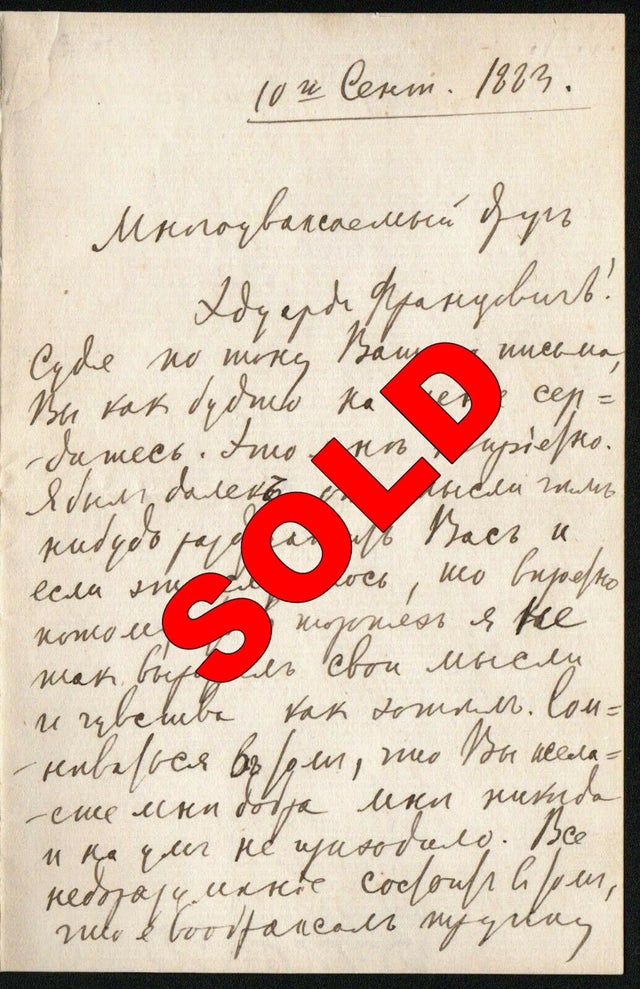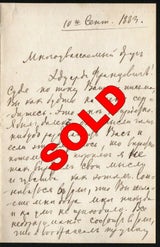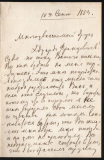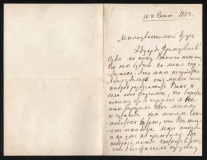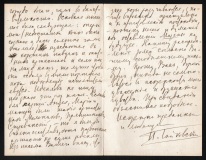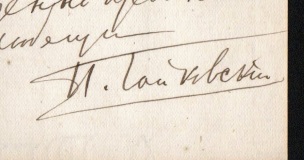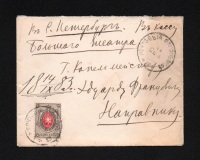- Store
- >
- Classical music
- >
- 1883 Pyotr Ilyich Tchaikovsky autograph letter signed (ALS)
1883 Pyotr Ilyich Tchaikovsky autograph letter signed (ALS)
SKU:
£0.00
Unavailable
per item
Tchaikovsky discusses the staging of Mazeppa with the conductor of St. Petersburg's Imperial Opera
ALS in Russian, signed “P. Tchaikovsky,” three pages on two adjoining sheets, 4 x 6, September 10, 1883. Letter to the important Russian composer and conductor Eduard Frantsevich Napravnik, the director and chief conductor of the imperial theatres in St. Petersburg. In part (translated): "Judging by the tone of your letter it seems that you are angry with me and this makes me very unhappy. It was never my intention to irritate you about anything, but if this has happened, then it can only have been due to a hasty or poor choice of words on my part when I expressed my thoughts and feelings. It has never occurred to me to doubt that you wish me well. The whole misunderstanding lies in the fact that I had imagined the company was much richer than it is in reality. My main concern is as follows: my operas (the shortcomings of which I am fully aware and acknowledge even more strongly than anyone else) need good singers and experienced actors; and if these people are not presently available, then it is better to delay the performance of the opera until they are available. I am not looking for perfection, as I know this does not exist. If there had been actors like Meljnikov, Pryanishnikov and Stravinsky for the parts of Andrey, Maria and the mother I would have been quite happy, although even these actors are not ideal. From your letter I can see that you have already begun to rehearse the choirs, and since you have already started work on the set, we will not be able to postpone Mazepa until a future date. I am therefore going to assign the roles according to your letter of today. l ask you, dear friend, never to doubt the sincerity of my respect and feeling of friendship. We will discuss this in more detail when we meet." In fine condition. Accompanied by the original mailing envelope.
Tchaikovsky's correspondent, Eduard Napravnik, had been the director of the imperial theaters since 1869, and had improved the orchestra of the Imperial Opera to the point that it was regarded as one of the finest in the world. The singer Feodor Stravinsky (father of composer Igor Stravinsky), to whom Tchaikovsky refers in this letter, was one of the leading singers of St. Petersburg's Imperial Opera, but was apparently unavailable to perform in Tchaikovsky's Mazeppa. Tchaikovsky composed the opera Mazeppa between June 1881 and April 1883, the libretto based on Alexander Pushkin's narrative poem Poltava. The premiere performance took place on February 15, 1884, at the Bolshoi Theatre in Moscow, and four days later it premiered in St. Petersburg at the Mariinsky Theatre conducted by Eduard Napravnik. Tchaikovsky's concerns were not unfounded as in both performances, the work was brilliantly staged but marred by the uneven vocal and acting abilities of the cast.
ALS in Russian, signed “P. Tchaikovsky,” three pages on two adjoining sheets, 4 x 6, September 10, 1883. Letter to the important Russian composer and conductor Eduard Frantsevich Napravnik, the director and chief conductor of the imperial theatres in St. Petersburg. In part (translated): "Judging by the tone of your letter it seems that you are angry with me and this makes me very unhappy. It was never my intention to irritate you about anything, but if this has happened, then it can only have been due to a hasty or poor choice of words on my part when I expressed my thoughts and feelings. It has never occurred to me to doubt that you wish me well. The whole misunderstanding lies in the fact that I had imagined the company was much richer than it is in reality. My main concern is as follows: my operas (the shortcomings of which I am fully aware and acknowledge even more strongly than anyone else) need good singers and experienced actors; and if these people are not presently available, then it is better to delay the performance of the opera until they are available. I am not looking for perfection, as I know this does not exist. If there had been actors like Meljnikov, Pryanishnikov and Stravinsky for the parts of Andrey, Maria and the mother I would have been quite happy, although even these actors are not ideal. From your letter I can see that you have already begun to rehearse the choirs, and since you have already started work on the set, we will not be able to postpone Mazepa until a future date. I am therefore going to assign the roles according to your letter of today. l ask you, dear friend, never to doubt the sincerity of my respect and feeling of friendship. We will discuss this in more detail when we meet." In fine condition. Accompanied by the original mailing envelope.
Tchaikovsky's correspondent, Eduard Napravnik, had been the director of the imperial theaters since 1869, and had improved the orchestra of the Imperial Opera to the point that it was regarded as one of the finest in the world. The singer Feodor Stravinsky (father of composer Igor Stravinsky), to whom Tchaikovsky refers in this letter, was one of the leading singers of St. Petersburg's Imperial Opera, but was apparently unavailable to perform in Tchaikovsky's Mazeppa. Tchaikovsky composed the opera Mazeppa between June 1881 and April 1883, the libretto based on Alexander Pushkin's narrative poem Poltava. The premiere performance took place on February 15, 1884, at the Bolshoi Theatre in Moscow, and four days later it premiered in St. Petersburg at the Mariinsky Theatre conducted by Eduard Napravnik. Tchaikovsky's concerns were not unfounded as in both performances, the work was brilliantly staged but marred by the uneven vocal and acting abilities of the cast.
Sold Out

